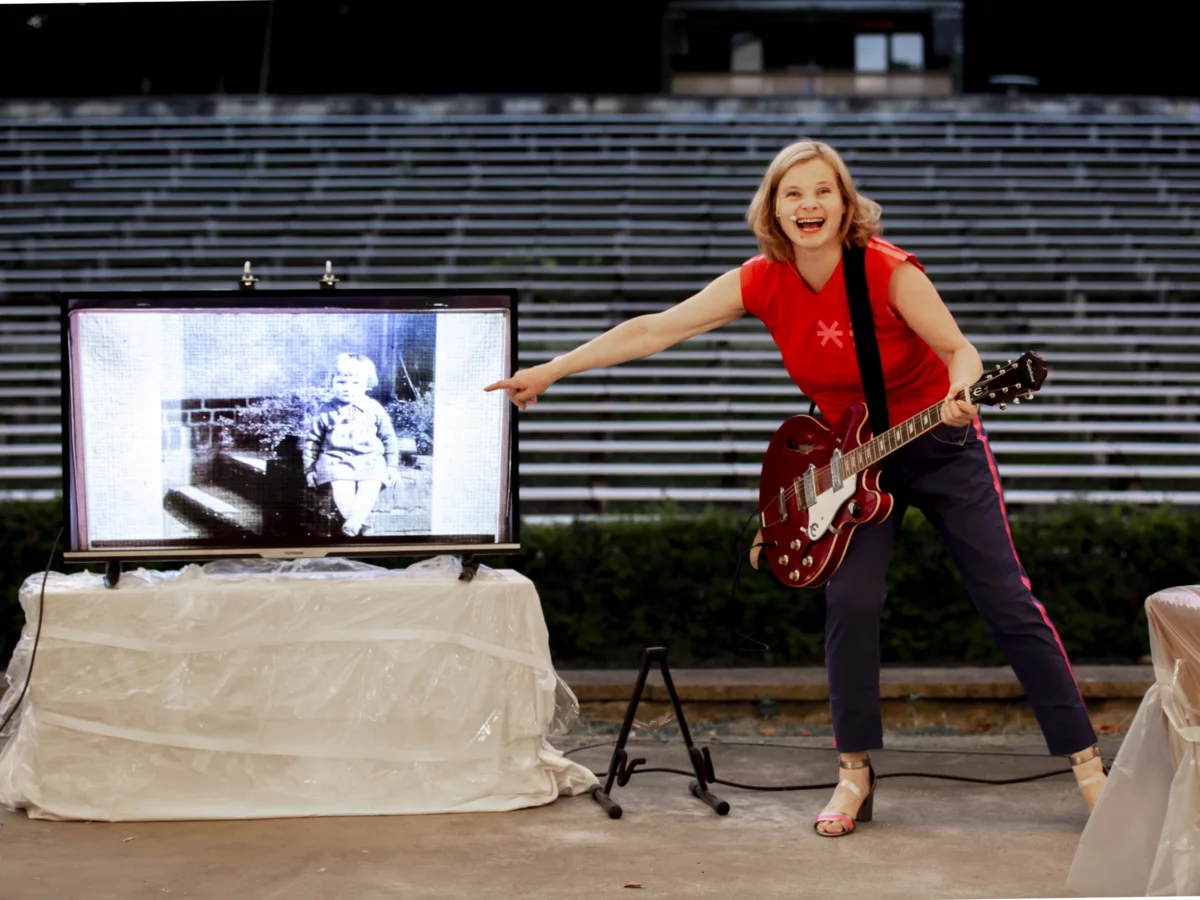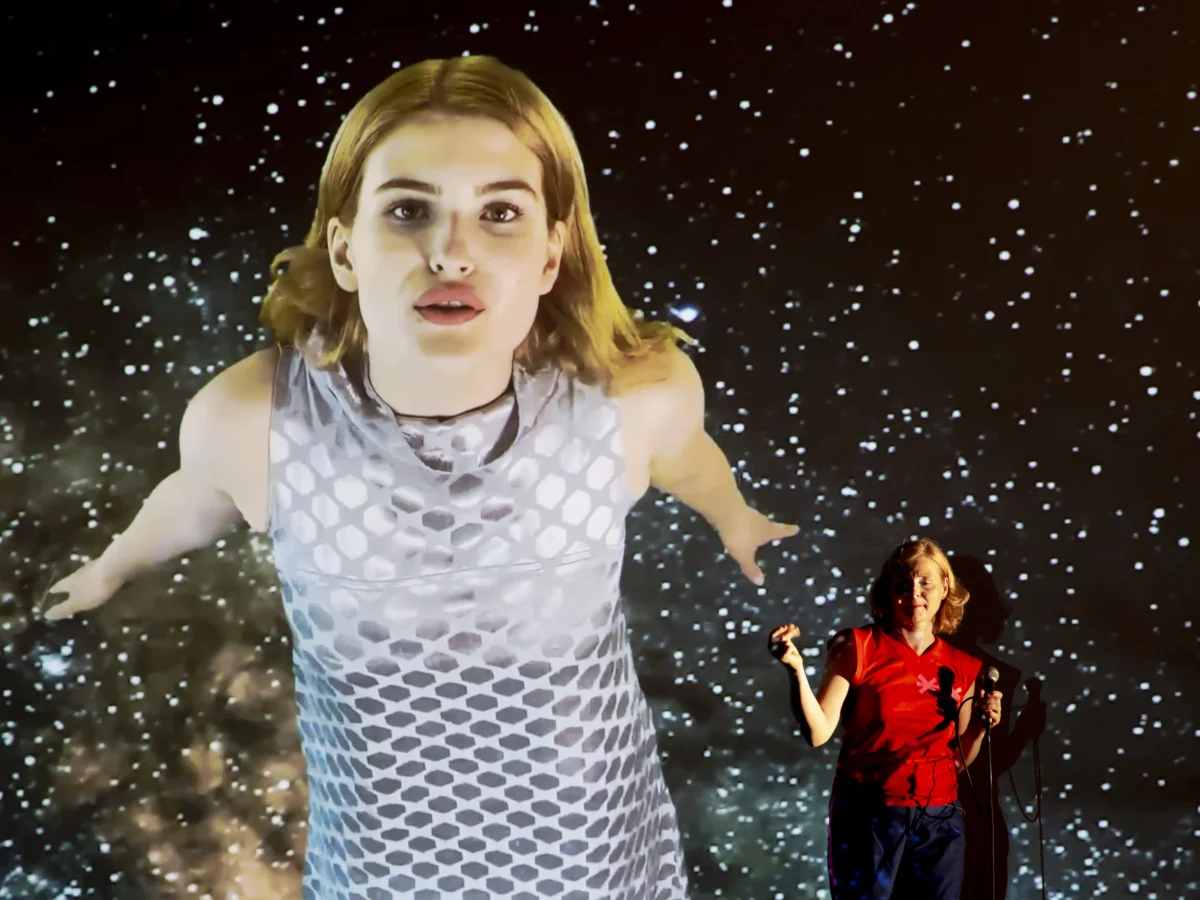Wherever I write a song
By Georg Kasch
Bernadette La Hengst's evening "Mutter**Land" tells of the transitional nature of life through her family’s story. A contribution by Georg Kasch.
 © Jasper Kettner
© Jasper Kettner
Bernadette La Hengst in der Performance "Mutterland"
It’s a fresh, spring evening in Berlin. While the audience on the grounds of the Freilichtbühne Weißensee huddle together on chairs, stools, benches, turn up their collars and wrap blankets around themselves, Bernadette La Hengst stands at the front of the stage, T-shirt, open-toe shoes, and sings: "Où êtes vous à Beirut?" Suddenly the air seems to be charged with warmth and one senses the scents of restaurants and cafés in this city, once praised as the "Paris of the East". The vibrant wail that La Hengst turns into the eponymous question of her song – Where are you (here) in Beirut? – is reminiscent of the melismas of the Middle Eastern musical tradition. When the oud, the Arabic predecessor of the lute, plays alongside La Hengst's electric guitar, the air shimmers.
"Où êtes vous à Beirut?" leads us straight to the core of the search that Bernadette La Hengst undertakes in her evening "Mutter**Land". Where do I come from? Where am I going? On the one hand, La Hengst tells the story of her mother Gitti Grytz: Born in Silesia, her family fled first to Saxony, then to the West, later she lived in Lebanon and Syria — and died of cancer at an early age. On the other hand, she addresses her own role as a working mom: participating via zoom, La Hengst's daughter Ella comments on the stories, thinks along with them, but is also careful to keep her distance from the La Hengst's musings: "You must ask your mother that, not me."
Because these family stories show how provisional life is, the audience is also on the move during the evening, changing location five times, sometimes looking at a screen, sometimes at a stage then, once more, at the empty rows of the open-air stage built in the 1950s. Each stop stands for a period of life, also a place: Silesia, GDR, Bad Salzuflen, Beirut, Berlin. And in each new situation La Hengst sings her songs, the oldest "Provisorisch" from 1995, the most recent "Gib mir meine Zukunft zurück" from 2021, still unreleased.
Stephanie von Beauvais has mixed historical and current material in her videos; postcards, cell phone videos, yellowed photos, Gitti's school essays on the subject of home. Sometimes daughter Ella, in white lace, ghosts through the picture as Gitti, once more apparently joins the dialogue live from her room. The only real person on stage is La Hengst with her electric guitar — all other voices and sounds are mixed in. Only afterwards does one wonder how this can work so perfectly.
The fact that the premiere on June 30, 2021, took place not in the co-producing Sophiensæle, but on the open-air stage in Weißensee, was due to corona – and had a decisive impact on the evening. "The East-West history, the provisional, the changing locations – it's all in the place," says La Hengst. "The idea of the walk first came to us there."
The idea for an evening about her own family history is older, however. For a long time, La Hengst wasn’t interested in it, "because for us the Silesians were all Nazis, people who brushed everything under the carpet – I wanted to get out." In 2015, however, La Hengst was involved in the project Mehrheitsgesellschaft (Majority Society) at the Theater Freiburg, in which senior citizens over 70 and young refugees took part together. One of the older women had fled Silesia when she was five years old – like La Hengst's mother. "I knew then that now was the time to explore my story."
 © Jasper Kettner
© Jasper Kettner
Bernadette La Hengst in der Preformance "Mutterland"
Much was contributed by her mother's sister, while La Hengst did other research. Some things came about by chance, like the visit to her grandmother's house near Katowice. For others, she was already aware that it could lead to something like her trip to Beirut in 2019 – only what Ibrahim Shehab's filming would lead to was not clear. During the first year of the pandemic, the project crystallized as a collaboration between mother and daughter: "Ella's perspective is important in order to question the narrative – we were the good ones, the reflective ones, the open ones – sometimes," says La Hengst.
For La Hengst, the fact that the production can be shown again in 2022, thanks to the Fonds Darstellende Künste’s resumption funding, is a stroke of luck: "Three to four years of work and a lot of love went into it. It can't be over after four performances." She has stretched the funding to three venues – after the performances in April in Hamburg and at the Freilichttheater Weißensee in May, there will be another performance in September in Hellerau/Dresden.
Another important aspect for La Hengst is the idea of sustainability that goes into putting on a show more than once. "It doesn't make sense to constantly have to come up with five projects at the same time," she says. "It's better to do one properly." What's also sustainable is the set design, which is largely based on location and for which hardly anything had to be purchased new. And then there's the idea of crossover – a mix of genres and audiences. It's hard enough to get concert audiences into the theater and theater audiences into concerts. "That's why the show should be put on much more often!"
This is also of importance because "Mutter**Land" succeeds in doing something wonderful. During the extremely relaxed, quiet, friendly evening the audience is taken by the hand and what is personal becomes universal too. It points out traumas that run through the generations of German post-war society, exposes the victim narratives of the AfD and questions our own certainties. Afterwards, La Hengst opens her photo album to talk with the audience. About family stories, journeys through life, home, or Heimat, this fragile, sometimes abused term, for which La Hengst has found such a beautiful definition, "Wherever I write a song, is where I am at home."
Further performances: Sunday, Sept. 11 in Hellerau - europäisches Zentrum der Künste (European Center for the Arts)
Further performances for 2023 in Freiburg, Munich and Bremen have been requested
From funding to the rehearsal room and onto stage - cultural journalists Georg Kasch and Elena Philipp visit funded projects as part of the Fonds Darstellende Künste’ #TakeHeart